Hapi Life
Spring-clean your finances
Posted on 20 April 2022
1. Organise all your bills to come out on the same day every month
Paying subscriptions and bills on a monthly basis gives you a fair idea of how much disposable cash you have in your account on any given day. So why not try organising all your bills to come out on the same day each month?
That way, you will know for sure that any money left over is yours to keep. You should be able to move the date of your direct debits by speaking to your providers directly.
2. Identify your ‘bottomless spending pits’
Take a look at your expenses over the past month. Are there any products or services that you seem to be spending more on than anywhere else? It could be multiple online purchases or a takeaway habit that keeps tripping you up.
This is a ‘bottomless spending pit’ – identify yours and make a plan to control your spending for this particular thing. You could designate a day of the week as ‘takeaway day’, or delete shopping apps from your phone to make you less tempted to splurge (this really works!).
3. Be a savvy food shopper
Speaking of takeaways… according to KPMG research, the average Brit spends £641 a year on takeaway meals. So save your cash and go for a homemade ‘fakeaway’ instead.
Doing your food shop online enables you to check your cupboards and buy only what you need, instead of being tempted by offers in-store. It’s also easier to check the price difference between branded items and supermarket own-brands.
For more tips, check out our article How to save money on your supermarket shop.
4. Spend from a different bank account
One of the simplest budgeting techniques is the ‘satellite bank account’ strategy. This where you have two bank accounts – the one you get paid into and pay your monthly bills from (your needs), and a second account that you pay a set amount into each month for day-to-day spending (your wants).
Transfer a set amount into your second account each month and use it for things such as eating out and buying clothes. You’ll be surprised how naturally your spending will adjust. Additionally, money management apps can help you identify your downfalls and set spending plans.
5. Start saving
Now is as good a time as ever to start a savings habit. Having a cash buffer or emergency fund is important and will help you to navigate much of the uncertainty we have been facing over the past couple of years.
Could you save 1% of your salary? Up that 1% by an additional per cent each or every other month, if you can, and you’ll soon have a good amount tucked away.





